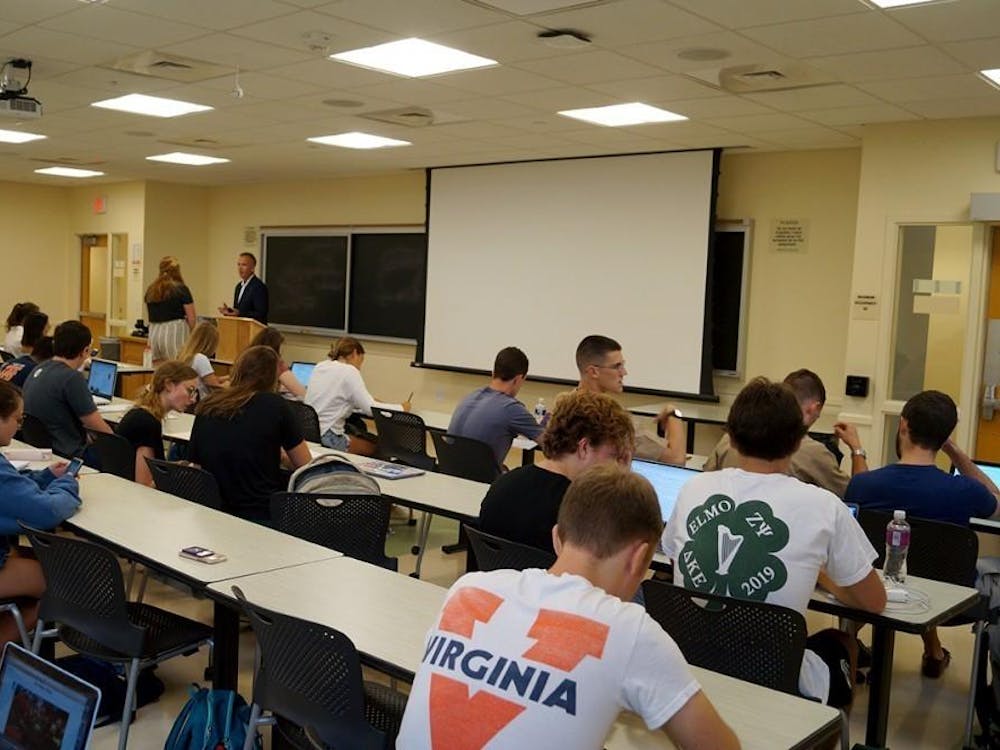AN UNCOMPROMISING belief in the equality of opportunity lies at the heart of the "American dream." Horatio Alger's rag-to-riches stories perhaps best captured this conviction that working-class Americans could achieve success through hard work and determination. Today, however, such examples are largely illusory -- especially in Charlottesville. Increasingly, social mobility requires a college degree. For America's impoverished children, education provides the only means to escape destitution and acquire a better future: Dreams are made and destroyed in the classroom. Unfortunately, in Charlottesville, tracking organizes a diverse student body into ability groups that reflect the social inequities outside of school. Rather than liberate students, tracking exacerbates existing inequalities and sets low-income, minority students on an inevitable path to failure.
In Charlottesville High School, ability grouping dominates the school atmosphere and practically creates three schools in one. According to one teacher, CHS administrators and teachers avoid using the words "tracking" and even "ability grouping," but the existence of these policies is strikingly apparent. The CHS Web site even states that ninth graders are placed in math classes based on a "variety of performance indicators and teachers recommendations." Sadly, these divisions are all too predictable. The white children of affluent college graduates constitute the vast majority of students on the advanced track. Alternatively, students from poorer backgrounds fill the remedial courses.
The emphasis on ability grouping at CHS reflects its diverse student body. White students comprise 45.9 percent of the CHS student body; another 45.9 percent are black. While many come from college-educated, wealthy families, 40.1 percent of students are economically disadvantaged. To cope with this heterogeneous population, CHS administrators organize students into homogeneous subgroups. Unfortunately, these groups provide unequal resources and opportunities for students. In 2006, 91 percent of CHS's white students passed the state reading exam; only 49.4 percent of black students did. 45.2 percent of economically disadvantaged students failed the state math exam. Clearly, CHS's current policies fail to help the students who need help most. The results are saddening but not surprising; they are the natural product of institutionalized tracking.
The consequences of tracking on "low-ability" students are well-documented and substantial. Numerous studies have found ability grouping significantly hurts the performance of low-group students. By separating students based on ability, tracking damages the self-evaluations of low-group students. And as low-group students lose motivation, tracking can become a self-fulfilling prophecy. The students at CHS understand they have been separated based on perceived academic ability. For example, in one CHS remedial algebra class in which I tutored, a student labeled himself and his classmates as the "dumb kids" as if it were an obvious fact. Ideally, placing low-ability students in homogeneous groups would permit teachers to construct lesson plans geared for them and accelerate their progress. But this ideal does not reflect reality. Low-ability group programs rarely succeed in returning students to regular-ability groups. For the most part, placing students on a low track permanently determines their future educational opportunities. Rather than encouraging students to pursue their dreams, tracking limits their dreams from the start.
Instead of tracking, CHS should gradually reduce ability grouping, institute new opportunities for extra help and set higher standards for all students. In its step-by-step process of untracking, CHS should initially focus on reforming the curriculum for incoming ninth graders. For example, at the start of ninth grade, CHS should enroll all students in algebra -- with perhaps one separate class for truly "gifted" students. To enable heterogeneous algebra classes in ninth grade, College Board's Equity 2000 program includes algebraic concepts in the middle school curriculum. CHS could work with Buford and other area middle schools to institute a similar policy. Untracking would force CHS and other Charlottesville schools to provide struggling students with extra help outside of class rather than just place them in a remedial class.
At CHS, honors courses teach key concepts and encourage collaboration; alternatively, "remedial" and "basic" courses focus on worksheets and teach tricks for the exams. In untracking, CHS administrators must be careful not just to water down the general curriculum; instead, they must give all students the opportunity to develop the conceptual foundations to learn higher math, write a critical essay or read a challenging novel. Several studies have concluded a rigorous curriculum in high school is the greatest determinant of college attendance and success. By setting a rigorous curriculum and high expectations for all students, CHS can enable new students to access higher education without hurting their classmates.
In Charlottesville, public education can be the great equalizer. It can provide the region's most needy students with limitless opportunities. But ability grouping is inconsistent with these aims. At CHS, tracking segregates the student body and perpetuates inequality. The numbers do not lie: Charlottesville's achievement gaps are severe. Sadly, tracking avoids the problem rather than combating it. In an school with 40 percent of students listed as economically disadvantaged, Charlottesville administrators have the opportunity to dramatically alter the lives of countless students, but first they must alter school policies. Untracking education in Charlottesville will not be easy, and it will not be without opponents. If accomplished, however, curriculum reform could boost performance across the board and encourage all students to reach their potential. It could permanently remove thousands of Charlottesville students from poverty and send them to college. It could literally save their lives.
John Nelson is a Cavalier Daily Viewpoint Writer.






